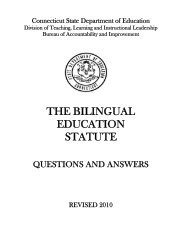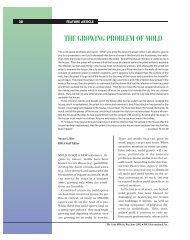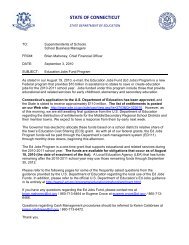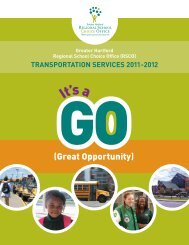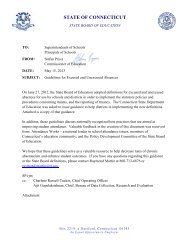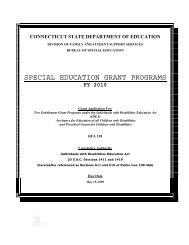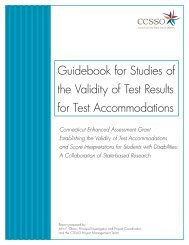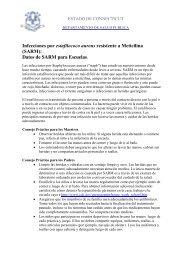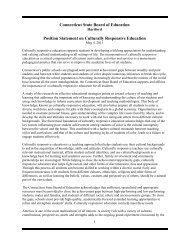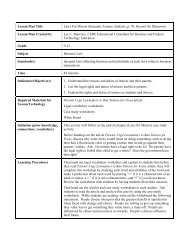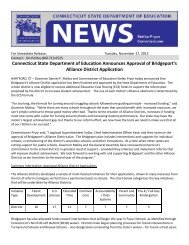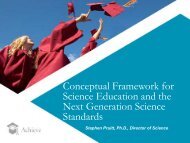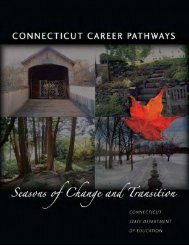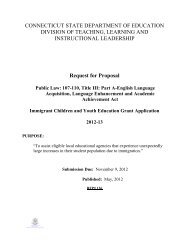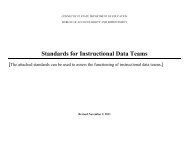Early Childhood - Connecticut State Department of Education
Early Childhood - Connecticut State Department of Education
Early Childhood - Connecticut State Department of Education
You also want an ePaper? Increase the reach of your titles
YUMPU automatically turns print PDFs into web optimized ePapers that Google loves.
Science Chapter 7<br />
BEST PRACTICES<br />
It is recommended that early childhood educators consider<br />
for implementation the following best practices in<br />
the discipline <strong>of</strong> science.<br />
• Science should not be taught in isolation.<br />
Look for opportunities to integrate with literature,<br />
mathematical thinking, classroom<br />
projects or themes, and interests <strong>of</strong> the children.<br />
• Experiment with and investigate materials<br />
before bringing them to the children. Recognize<br />
the value and usefulness <strong>of</strong> materials<br />
for provoking, engaging and sustaining<br />
children’s thinking.<br />
• Recognize that time is essential when investigations<br />
are proceeding. Plan within the<br />
weekly schedule for long blocks <strong>of</strong> uninterrupted<br />
work time.<br />
• Collect unusual and typical materials. Explore<br />
various approaches to motivating and<br />
stimulating ideas in the science area and at<br />
the sand or water tables. Provide real tools<br />
to support the seriousness <strong>of</strong> the children’s<br />
work, recognizing that more supervision<br />
may be necessary. Ask yourself these questions<br />
when choosing materials:<br />
− Will the children be interested?<br />
− Will I be interested in exploring these<br />
ideas with the children?<br />
− Will these engage children in experimentation<br />
and manipulation?<br />
− Will the experiences encourage social<br />
interaction and problem solving?<br />
– Will these materials lead to exploration<br />
<strong>of</strong> valuable content?<br />
• Plan for the children to be immersed in the<br />
activities which are minds-on and hands-on.<br />
• Use the outside environment for exploration<br />
and investigation. Even a walk around a city<br />
block can stimulate issues to examine.<br />
• Provide adaptations and accommodations<br />
for children who may need more time, assistance<br />
with materials, or a more directed<br />
experience.<br />
• Share information with parents on the various<br />
skills the children are developing as they<br />
experiment and investigate.<br />
• Observe and listen. When the questions stop,<br />
the children need you to focus their investigation,<br />
provide new materials, guide new<br />
challenges or motivate new projects.<br />
107<br />
References<br />
• Resist the urge to integrate the study or project<br />
into every center <strong>of</strong> the room. Keep it<br />
grounded by the children’s questions.<br />
• Keep engagement high. Support sustained<br />
interest by making connections to experts,<br />
field trips and/or literature.<br />
Bowman, B.; Donovan, M.S. and Burns, M.S. (Eds.) and<br />
National Research Council. Eager to Learn: Educating<br />
Our Preschoolers. Washington, DC: National<br />
Academy Press, 2001.<br />
Bredekamp, S. and Rosegrant, T. Reaching Potentials:<br />
Transforming <strong>Early</strong> <strong>Childhood</strong> Assessment, Vol. II.<br />
Washington, DC: National Association for the <strong>Education</strong><br />
<strong>of</strong> Young Children (NAEYC), 1995.<br />
<strong>Connecticut</strong> <strong>State</strong> Board <strong>of</strong> <strong>Education</strong>. The <strong>Connecticut</strong><br />
Framework: <strong>Connecticut</strong>’s Preschool Curriculum<br />
Framework. Hartford, CT: <strong>Connecticut</strong> <strong>State</strong> Board<br />
<strong>of</strong> <strong>Education</strong>, 1999 (and 2005 and 2006 reprints).<br />
National Research Council. National Science <strong>Education</strong><br />
Standards. Washington, DC: National Academy<br />
Press, 1996.<br />
Resources<br />
American Association for the Advancement <strong>of</strong> Science<br />
(AAAS). Dialogue on <strong>Early</strong> <strong>Childhood</strong> Science, Mathematics<br />
and Technology <strong>Education</strong>. Washington, DC:<br />
AAAS, 1999.<br />
Brewer, J. Introduction to <strong>Early</strong> <strong>Childhood</strong> <strong>Education</strong>. Boston,<br />
MA: Allyn & Bacon, 1998.<br />
DeVries, R. and Kohlberg, L. Constructivist <strong>Early</strong> <strong>Education</strong>:<br />
Overview and Comparison with Other Programs.<br />
Washington, DC: National Association for the <strong>Education</strong><br />
<strong>of</strong> Young Children (NAEYC), 1987.<br />
Dinwiddle, S. Playing in the Gutters: Enhancing Children’s<br />
Cognitive and Social Play. Washington, DC: NAEYC,<br />
1993.<br />
Doris, E. Doing What Scientists Do: Children Learn to Investigate<br />
Their World. Portsmouth, NH: Heinemann,<br />
1991.<br />
Forman, G. Helping Children Ask Good Questions. The<br />
Wonder <strong>of</strong> It. Redmond, WA: Exchange Press, 1996.



